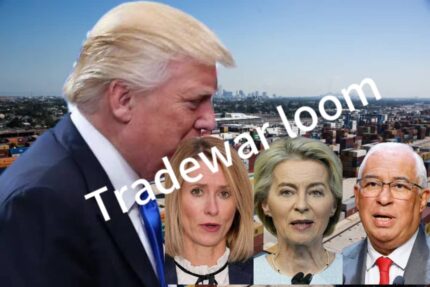U.S. President Donald Trump has intensified trade tensions by imposing a 25% tariff on steel and aluminum imports, ending exemptions for key trading partners such as the European Union (EU), Canada, and the United Kingdom. Trump’s announcement, made on Wednesday, has triggered strong reactions from global leaders and financial markets, raising fears of a prolonged trade war that could disrupt economic stability worldwide.
Speaking at the White House, Trump justified his decision as a measure to protect American industry and workers. “Whatever they charge us with, we’re charging them,” he declared, signaling his intention to impose reciprocal tariffs on countries that retaliate. He also reiterated his frustration with existing trade agreements, accusing international partners of taking advantage of the U.S. economy.
EU and Canada Strike Back with Retaliatory Tariffs
The EU and Canada, among the hardest-hit by Trump‘s tariff policy, have swiftly responded with their own countermeasures. Canada, which supplies the largest share of steel and aluminum to the U.S., has announced a 25% tariff on nearly C$30 billion ($20 billion) worth of American goods, including steel, computers, and sports equipment. Prime Minister-designate Mark Carney emphasized that Canada is “ready to negotiate a renewed trade deal with Trump, as long as there is respect for Canadian sovereignty.”
Similarly, the EU has unveiled plans to impose tariffs on U.S. goods worth up to €26 billion ($28 billion). The targeted products include bourbon, motorcycles, and boats—items strategically chosen to impact industries in politically sensitive regions of the United States. EU President Ursula von der Leyen described the countermeasures as “strong but proportionate” and warned that a full-scale trade war would be damaging to both sides. “Tariffs are taxes. They are bad for business and worse for consumers,” she said, underscoring concerns over rising prices and job losses.
UK and Australia Take Cautious Approach to Trump tariffs war
The United Kingdom and Australia have expressed their disapproval of Trump’s tariff escalation but have refrained from immediate retaliation. UK Prime Minister Sir Keir Starmer described the move as “disappointing” but emphasized that Britain would take a pragmatic approach in dealing with the issue. “We are negotiating a deal that includes tariffs if we succeed. But we will keep all options on the table,” he said.
Australian Prime Minister Anthony Albanese condemned the tariffs as “entirely unjustified” and contrary to the long-standing economic partnership between the U.S. and Australia. Efforts by Australian officials to secure exemptions have so far been unsuccessful, raising concerns among businesses and exporters who rely on stable trade agreements with the U.S.
Business Community and Financial Markets React
Major U.S. businesses and financial markets have reacted with alarm to the escalating trade tensions. Leading food companies such as Quaker Oats, PepsiCo, and J.M. Smucker have called on Trump to exempt key ingredients like cocoa, fruit, and tin mill steel, arguing that these imports are not available domestically. The Consumer Brands Association, a trade group representing packaged food manufacturers, has warned that the tariffs will lead to higher prices for everyday goods.
On Wall Street, the Dow Jones Industrial Average fell by 0.2% on Wednesday, while the S&P 500 posted a modest 0.5% gain. The tech-heavy Nasdaq showed resilience, rising by 1.2%. However, the broader financial outlook remains uncertain as investors weigh the long-term implications of the tariff war. Goldman Sachs CEO David Solomon acknowledged Trump‘s engagement with business leaders but expressed concerns that continued tariff hikes could slow economic growth and dampen investor confidence.
Global Trade Relations in Jeopardy
The latest tariff escalation has put the U.S. at odds with its closest allies, raising concerns over the future of global trade relations. While Trump insists that his trade policies will ultimately benefit American workers, critics warn that protectionist measures could backfire by increasing production costs, reducing export competitiveness, and straining diplomatic ties.
China and Japan have also voiced their concerns, with Beijing vowing to “safeguard its interests” and Tokyo warning that the tariffs could have a major impact on U.S.-Japan economic relations. Meanwhile, Brazil, a key steel exporter to the U.S., has opted for a wait-and-see approach, declining to impose retaliatory measures immediately.
As the trade war escalates, the coming months will be crucial in determining whether diplomatic negotiations can ease tensions or if further tariff battles will deepen the divide between the U.S. and its global trading partners.














